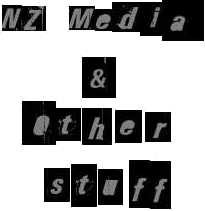
I'm being unfair. Mr Roughan did actually address a couple of timely issues in his interview with Mr Joyce, such as the Labour Party's response to the economic crisis and the unveiling of the universal student allowance policy. And Mr Joyce, to his credit, addressed them - even if it was merely to bat them away.
However, after his auspicious start, a fairly lame profile piece followed - something that is happening in far too many papers at the moment. I don't think I'm alone in considering a straight profile of a political candidate to be boring and unambitious.
Sure, give us a general outline of who the candidates are and what they have done in their previous lives, but stick with a line of questioning where the reader might actually get some handle on what the candidate stands for, what their motivations for entering public office are, and what they plan to do, given the opportunity, when they take the reins of power.
Y'know, act like a representative of the Fourth Estate and all that jazz.
OR, if you must do a profile (and I'm feeling charitable here)...
Don't make it a promo listing all of the candidates' achievements... we know these people are talented - it's generally why they manage to get into the party hierarchy. What's more interesting is how they've acted in their previous incarnations, and how this may relate to how they'll represent us in the future.
Curiously, a quick google search finds few acknowledgements of Mr Joyce's tenure ever occurring: there's a post by DPF at the end of November 2005 and another, which no longer exists, but has an extract available on Lawswatch.
I find nothing untoward about commericial radio holding a conservative bias - it's a natural fit, much like the perceived liberal bias associated with public radio - it's just that, y'know, I would have liked to have been made aware of the fact that there was some active political campaigning going on in the lead-up to a tight election that some 30-odd thousand people were listening to every day.
I can see the argument that would likely be put up - my opinions are obvious to anyone who listens to me, and my audience, in the main, agrees with my point of view, but that's a little different form being active in a party political campaign while putting out your views as an independent voice (albeit, a conservative one).
I know all of this screams conspiracy, and I don't actually have a problem with figures in the media holding a political bias. I think it's good for views contrary to my own being pushed and discussed in an open forum. But an open forum requires a certain level of disclosure, and Mr Joyce's inability to let his listeners know that he was actively campaigning for the Nats in '05 leads me to conclude there's only one position he wants after November 8...
... and that's the role of Machiavelli's Prince, Murray McCully.Thus ends my case study and wildly inaccurate conclusion.
I'm sure the nation's fearless army of journalists would be happy to dig a little deeper when approaching their candidates for a simple profile piece - it's certainly a lot more fun to do (and read). And maybe, just maybe, it might inform the public of whom, and what, they're actually voting for.
Dreaming of better journalism,
PB.




2 comments:
Hey PB, having read your article, I now eagerly await reading any profiles you might intend doing on some of the political candidates. Is this likely?
Have to admit to being snowed under at the mo - but you never know - we could see some digging. I'll see what I can do.
PB.
Post a Comment